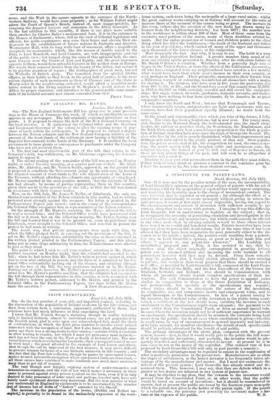IRISII IMPROVEMENT.
Limerick, 8th July 1851. Sin—In the last number of your able and impartial journal, referring to the diminution of the population of Ireland as shown by the late census, you draw from certain facts a conclusion, apparently authorized by them, that evictions have had much influence in thus unpeopling the land. I know that Mr. Poulett Scrope's statistics, though in reality referring only to limited districts, almost to individual cases are yet generalized by the English mind, glad to seize upon any acknowledged fact, amid the chaos of contradictions in which the Irish press contrive to involve every subject connected with the occupation of land. But I also know, that, although some years ago there was a strong desire to dear estates' —a desire which I condemn Ail often leading to cruelty, but which I must yet pronounce most natural,— such has not been the case in the West or South of Ireland of late. The uni- versal distress which overwhelms the landlords ; their consequent want of means to stock land ; the proof afforded by the example of Lord Lucan and others
that though the soil be improved in the best manner, it may prove difficult
to procure tenants for farms of a size hitherto unknown in this country; and the fact that the Poor-law collector, though he passes by unoccupied houses, :wakes no such favourable exemption where untenanted lands are concerned,— all these causes have combined to make landlords now much more anxious to ikee_p than to get rid of tenants. The vast though now happily expiring system of under-tenancies and tenancies-in-common, and the rule of law which makes it necessary in these Asses to proceed against every person resident on the farm, even if it be only alesired to take possession of some small and perhaps deserted spot have cer- tainly made ejectment decrees very numerous. But the true number of what you understand in ..England by ejectments is to be ascertained by the number mot of decrees but.of writs-of "he:dere" executed by the Sheriff. The inoreaae in.the lepulation of the towns, (Dublin and Belfast ex- .septetl,).Mprobsibjy to he found in the melancholy expansion of the work- house system, each town being the metropolis of a large rural union : whilst the great railway works carrying on at Galway will account for the ratio of increase there at the moment of the census being so great. The increase in this town, (where also the erection of the new docks has drawn many la- bourers from the neighbouring district/a) has been 6877; the number now in the workhouse is within about 300 of that. Most of these come from the extensive rural portions of the union, many of them doubtless evicted te- nants. But the undue proportion of women and children points to the chief thing which has filled the workhouses,—the death of the husband and father in the year of pestilence, which carried off many of the upper and thousands upon thousands of the lower classes ; or his emigration. Most frequeritly the last. And why, it is easy to see. The habit is a very old one in philoprogenitive Ireland. A greater number than usual of ar- dent and stirring spirits proceeded to America after the ridiculous failure of Mr. Smith O'Brien's revolution. Whether from a generally high rate of wages in the United States, or from time effects of the Californian discoveries, all who have emigrated from my neighbourhood have saved in a few months what would have been their whole year's income in their own country, or even perhaps in England. Their prosperity, announced to their friends with a Hibernian warmth of colouring, has infected all classes here with a mania for sharing it. The farmers, who have seen in five years the poor-rates rise from 10d. to 15s. or 20s., and the Grand Jury cess of this county from 37,9701. in 1845 to 95,3951. in 1849, certainly crowded and still crowd the emigrant- ships. But single women, stewards, gardeners, domestic servants, and trades- men, who have nothing to fear from ejectments, fly to America in as great comparative numbers.
I only know the South and West ; but see that Fermanagh and Tyrone, where tenant-right reigns, and poor-rates are light and ejectments very un- common, have had then- population equally thinned ; no doubt from the same cause.
In the sound and statesmanlike view which you take of the future, I fully agree. The crisis has been a fearful one, but is now over. The young luau, and, thanks to the National Board, the well-educated one, the small shop- keeper, the railway or poor-law clerk, the Scotchman, the Englishman, and the Irish Protestant, now bear a much larger proportion to the whole pripula- tion of Ireland than they have done since the reign of George the Second. The class who live by the soil is greatly diminished, while land-improvement and drainage acts have added to the yearly produce of that soil. Over-popula- tion, the potato as sole staff of life, the competition for land, the eonacre sys- tem, the secret society with its houghed cattle and murderous code, the religious bigotry, the hatred of poor to rich and of Repealer to Saxon, all these are now altnast timings of the past, and will soon be so altogether if our rulers will permit it.
Trusting to your powerful pen to direct them in the path they must follow, if they wish to bring about so glorious a contrast to the centuries gone by, I have the honour to be, Sir, your most obedient servant, Q.


























 Previous page
Previous page